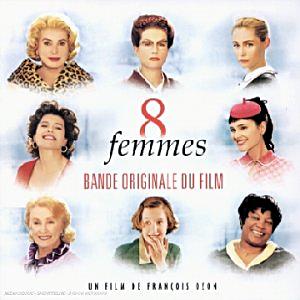8 Women
Music composed by Krishna Levy
With 8 songs sung by the eight stars:
- ‘Papa t’es plus dans l’coup’ by Ludivine Sagnier
- ‘Message personnel’ by Isabelle Huppert
- ‘A quoi sert je vivre libre’ by Fanny Ardant
- ‘Mon amour, mon ami’ by Virgine Ledoyen
- ‘Pour ne pas vivre seul’ by Firmine Richard
- ‘Pile ou face’ by Emmanuelle Beart
- ‘Tois Jamais’ by Catherine Deneuve
- ‘Il n’y a pas j’amour heureux’ by Danielle Darrieux
Available on Fidélité /Mars/WEA R2 73836
Running Time: 41:07
Amazon UK Amazon US

This is one of those fun scores that invites you to reminisce over song styles of a by-gone era, and to identify the influences of the orchestral sections.
The screenplay is about eight women in a snow-bound country house over Christmas (a sort of French Gosford Park). The master of the house is killed and one of the eight women did it, but which one? Nobody is quite what she seems.
The eight songs included on this album are very much of the late 1950s/ early ’60s, the period in which the story is set. Eight songs are sung by each of the actresses in turn, and in character. For instance, Ludivine Sagnier, the youngest, has a cheeky and lively girlish rock melody. Isabelle Huppert is buttoned-up, her delivery cold – almost a recitative. Fanny Ardant, in contrast, is smokily sexy. Virgine Ledoyen’s song recalls the Bosa-Nova vogue, Firmine Richard is dreamy like her adored cinema idols, and Emmanuelle Beart’s raunchy maid has a cheeky upbeat song. But the most expressive songsters are Catherine Deneuve (slinky, to a Latin rhythm) and Danielle Darrieux (poignantly and nostalgically romantic).
The album opens with ‘8 Femmes’ a lush sweeping romantic theme that recalls the music of the Golden and Silver Ages of Hollywood – passionate, yearning with a touch of menace and revenge? The influences are probably Steiner and Waxman. The other 12 orchestral cues all lightly scored, again of the period and obviously influenced by Bernard Herrmann – in fact there are overt references to both Psycho and Vertigo, particularly the romantic passages of the latter. But it is all done with such engaging charm that criticism is largely disarmed.
The review copy I received was published in French only, but an appreciation of the production can be gained by visiting http://www.8femmes-lefilm.com and clicking on the English version.
Slight, pleasant, tongue-in-cheek score nodding towards Herrmann in Hitchcock mode.
Ian Lace
3
Return to Index